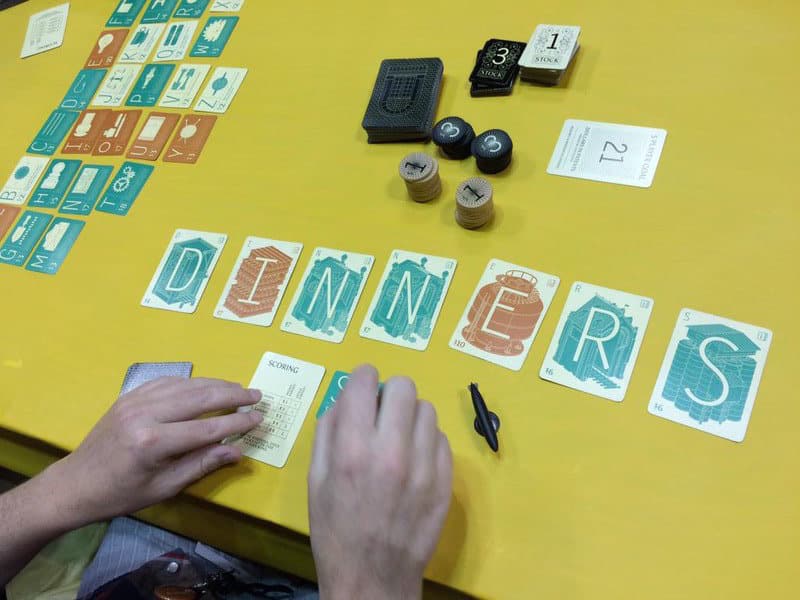
The idea for my word game, Letter Tycoon, came quickly. I didn’t study what made for a good word game experience and then craft a mechanic to exploit it. I just thought “How would I do a word game”, built a prototype and it (mostly) worked. It was during play testing that I really started learning lessons about word games and how players interact with them.
Many games require players to collect resources in various combinations to gain a reward. For instance, in Settlers of Catan five different resources (grain, ore, wool, brick and lumber) can be combined in 4 different ways to gain a benefit (road, settlement, city, or development). In word games you have 26 resources and there are thousands of ways you can combine them.
Catan gives you a handy reference card to show you what the resource combinations are. Word games provide guidelines about what combinations of resources (letters) are valid – like “no proper names” or “only English words” – but no reference to the complete list of combinations is provided. In fact it’s up to the players to memorize as many of the combinations as they can prior to playing the game. Fortunately this skill is useful outside the game as well.
In this way, a player with a significantly larger vocabulary begins the game with an advantage which must be balanced by other mechanisms or skill requirements for the game to be more than just a spelling bee. At the same time, if a player’s performance in the game is unrelated to their vocabulary then it will likely feel unfulfilling to word game fans. Trivia games face this same issue.
In many word games, like Scrabble and Letter Tycoon, the second skill players must exploit is the ability to unscramble the collection of letters they have to find words. The two skills, vocabulary and unscrambling, don’t necessarily develop equally and in practice I’ve found many people whose heads contain a robust lexicon but are flummoxed when trying to find a five letter word hidden amongst seven letter cards.
As an example, below are two ten letter sets. Each one contains a seven letter word. In which set do you find it easier to locate the word?
FPUERILEYW NGRKNINXJU
Did you find a word in each set?
DON’T READ THE ANSWER UNTIL YOU’VE TRIED.
Ok, in the first set of letters the word “puerile” appears unscrambled. Easy to spot if you’re familiar with the word but no help if you don’t recognize it. In the second set you can find the word “running”, which should be within anyone’s vocabulary that’s reading this, although the letters are quite scrambled. Which one was easier for you to find?
In Letter Tycoon I combined word building with an economic component (you can buy letter patents) in an attempt to make a word game that non-word game fans would enjoy as well. To some degree I was successful. But I found the most consistent predictor of player dissatisfaction with the game was when players had trouble “seeing” words in their hands of letter cards. If a player feels like they have a good vocabulary but can’t make more than a four letter word because they don’t have good unscrambling skills they’re going to feel somewhat frustrated. Every player isn’t going to be well suited to every game.
How do you feel about word games and to what degree does that reflect your vocabulary and/or unscrambling skills?








